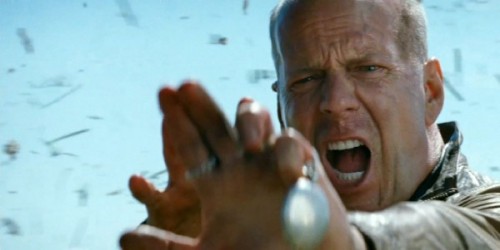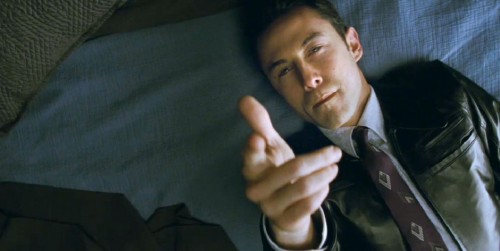(Foreword: Looper began its theatrical run last Friday, and at this point I presume most of you have seen it or are going to see it. That said, if you have not seen the film, steer clear of this essay; it is spoiler-heavy by the third paragraph. I also don’t rehash plot points in detail. Read at your own risk if you want to see the film blind.)
 Like many other films of its kind, Rian Johnson’s Looper is a time travel yarn that isn’t actually at all about time travel. One might argue that Johnson’s just letting himself off the hook by leaving the mechanics of such technology go unexplained, but truthfully the decision to forgo even the slightest attempt at explaining how time travel works is wise. To paraphrase the film, that time travel stuff really fries your brain like an egg, and so Johnson shrewdly opts to sidestep the question entirely in favor of exploring the themes and ideas he’s truly interested in. Looper might not offer any insights about time travel (beyond, of course, sharp barbs opining its complexity), but it speaks volumes about cycles of violence and growing up.
Like many other films of its kind, Rian Johnson’s Looper is a time travel yarn that isn’t actually at all about time travel. One might argue that Johnson’s just letting himself off the hook by leaving the mechanics of such technology go unexplained, but truthfully the decision to forgo even the slightest attempt at explaining how time travel works is wise. To paraphrase the film, that time travel stuff really fries your brain like an egg, and so Johnson shrewdly opts to sidestep the question entirely in favor of exploring the themes and ideas he’s truly interested in. Looper might not offer any insights about time travel (beyond, of course, sharp barbs opining its complexity), but it speaks volumes about cycles of violence and growing up.
Of course, that’s just a hallmark of great, classical science fiction. Looper, young in overarching cinematic canon, can’t really be described in those terms yet, but it certainly calls upon the traditions embraced by the best of its genre and follows in their footsteps by responding to a very basic formula: present far-off, inexplicable technological advances as utter window dressing, employ them in service of plot, and then use them to delve into deep-rooted, pertinent social issues. There’s nothing wrong with embracing Looper as a thrilling, exciting, gritty sci-fi action lark, of course, and in fact Johnson stages his shootouts and action set-pieces so cleanly and with such an inventive eye that he’s nearly inviting some viewers to do so. Looper‘s surface is all cool; it’s slickly made and acted with a surplus of low-key self-assurance.
But it’s also built on a foundation of cyclical violence which its characters often unwittingly perpetuate. It’s not until the end that the film’s protagonist, Joe, has an epiphany and realizes that violence simply begets more violence; he then chooses to make the ultimate sacrifice and commits suicide to prevent his future self from gunning down Sara and Cid, the mother and son whom the younger Joe stumbled upon living in secluded idyll on a farm. Joe sees– in a non-literal sense– that Sara’s death and Cid’s subsequent vagabond life will actually lead to the distant fate which Joe will himself end up fleeing from in thirty years; it is the first moment in the entire film where Joe shows some introspection and comes to understand that his actions have consequences. Future and present have bled together as we slide into the climax, but we know that the future can be changed, and with all of this in mind Joe makes the decision to turn his blunderbuss on himself.
Boiled down to the simplest interpretation, Joe is fulfilling his basic task as a mob hitman: he’s closing his loop. But at the same time, he’s closing the loop for everyone else, too. In taking his own life, Joe erases the timeline in which Cid becomes the Rainmaker, the man responsible for the pseudo-genocide that occurs in 2044 as all loops are closed en mass by his order and the older iterations of the younger loopers are sent back in time to be mercilessly gunned down. He simultaneously prevents Sara’s death, allowing her to continue being the mother Cid deserves and finally experience the parental bond with her child that she’s been missing for the bulk of her arc (since Cid does not accept that she’s his mother until near the end of the film). And let’s not forget that the younger Joe’s death means that the older Joe blinks out of existence*, his grief and rage dissolved in the time it takes to draw a single breath.

Truthfully, though, there’s nothing simple about the events of Looper ‘s climax when they’re analyzed past the surface. What is Joe really achieving by taking his life? Does his suicide secure a brighter future for the world, one in which Cid uses his unprecedented levels of telekinetic power to benefit mankind rather than act as that dreaded mob tyrant the older Joe hates so deeply? Is he simply delaying the inevitable? Or is he engineering favorable circumstances by keeping Cid off of one dark path and giving him the chance to shape his life the way he see fits for the very first time? It’s possible to answer these questions off-hand, but for a more satisfactory resolution to these queries and others we actually have to wrestle with that plot device which Looper so willfully, proudly refuses to expound upon.
Time travel and timelines actually hold the key to understanding just what Joe’s actions in the film’s climax truly mean. (And to avoid confusion, “Joe” shall now refer to Joseph Gordon-Levitt’s character, whereas Bruce Willis will be referred to as “Old Joe”.) When Old Joe returns from the future to kill children in an effort to keep the Rainmaker from ever rising to power, and we’re told his story in montage, Looper immediately poses a critical problem: if Sara was never shot by any iteration of Joe in Old Joe’s timeline**, how did Cid ever become the Rainmaker? Johnson coyly described this as a “chicken and egg” situation in an interview with /Film, but his film contains plenty of context for us to piece together how Cid became the Rainmaker without Old Joe’s intervention.
As we first meet Cid, he’s isolated on nearly every level imaginable. He lives on a remote farm with no one but his mother (who he initially doesn’t believe is his mother) for company; he has no other family, no father to speak of, and one of his earliest memories is the death of Sara’s sister, the woman he believes is his mother. On top of that he lives in constant fear of vagrant raids; the very real danger these attacks represent to Cid and Sara necessitates the construction of the escape in tunnel which Cid and Joe take shelter later on in the film. So the point should be clear: Cid never specifically needed Old Joe to kill his mother and disfigure him to become the Rainmaker. The events and circumstances of Cid’s life, from his loneliness to his familial confusion to his unintentional involvement in his aunt’s death, provide all the basis the boy needs to grow into a violent adult life.
All of this makes Joe’s actions and his behavior toward Cid even more powerful, meaningful, and important than they appear at first blush. Joe doesn’t simply save Sara and Cid from Old Joe, he actually gives Cid the chance at that he’d never had himself. As our hero chases the dangerous child through a cornfield, he comments on how Cid “doesn’t grow up good”; it’s not so much that Joe knows something about Cid’s future which Sara does not, but that Joe sees in Cid the same untethered anger and hatred that he personally felt as a child, from the time he was sold to criminals by his parents to his tutelage under Abe. Joe knows, better than anyone else, just what such an upbringing brings out in a child, so when he catches up to Cid, that uncannily brilliant boy who nonetheless has no idea why his life is the way that it is and who’s utterly terrified by his situation, Joe chooses to drop his weapon and reassure him that everything will be okay.

That Joe willingly surrenders his life for Sara and Cid’s is noble. That he reaches out to Cid beforehand and tries in earnest to comfort him is something else entirely. Joe doesn’t just close the loop through his self-sacrifice but through his earlier shows of compassion as well, and by offering both his own life and his sympathy he gives Cid the potential to do some good in the world (as Sara believes he can). In other words, he’s gifted Cid with a clean slate and an abundance of opportunity; Abe and the Gat Men all lie dead, the loopers are no more, and there’s a truck in the road bearing all of the wealth Joe hoarded over a lifetime of looping. Cid and Sara no longer face the threat of being hunted, and they can leave the farm– and marauding drifters– behind them. They’re free to begin their lives anew without the violence of their past existence hanging over their heads.
Nothing is guaranteed, of course; the future remains both uncertain and malleable. But as Looper comes to its close, the cycles of violence Johnson establishes from the very beginning of the film– from the cyclic nature of looping to the self-fulfilling prophecy of Old Joe’s mission– have been dismantled. Cid may yet become the Rainmaker, but if he does it won’t be because of Old Joe’s erratic gunshots or ill-intentioned transients. Joe has seen to that and liberated Cid from the known influences which could have led to that grim outcome by erasing them entirely. His selfless gesture capstones his journey of self-growth; by choosing to sacrifice himself, Joe relinquishes his self-absorption and entitlement and instead acts in the interest of another. And in that act, Joe finally assumes an active role in the course of his life and ends the violent patterns that have defined his own existence.
*I suspect that Old Joe’s final moments would play out like something out of Eternal Sunshine of the Spotless Mind as he loses all of the future memories he’ll now never have. The thought is heartbreaking.
**Remember, Old Joe’s timeline sees him successfully gun down his future self. Therefore there’s no Old Joe in his timeline to travel backwards in time to shoot Cid, so we can surmise that Cid became the Rainmaker in Old Joe’s own timeline under duress from other sources.


10 Comments
Victor
Great essay.
You did a great job of using the information in the movie to overcome the cause & effect paradox of time travel stories. I’ve learned with time-travel movies you can’t think about them too much because in the end the history will reset itself again.
Andrew Crump
Thanks, Victor. I will say that this essay is the product of a number of conversations I’ve had with a number of different people about the film, and if anything it proves that discussion is key to understanding a picture and mining meaning from it. I’m not sure if I could have really gotten there with this piece without those talks.
You’re definitely right, though, about time travel; I think to an extent it’s just not reasonable to pick apart their logic too much save for the most glaring of paradoxes and story conveniences. It’s basically magic as far as it concerns elements of story and plot.
Dan Fogarty
Wow man. That is a crazy analysis. Did you need charts and slide rules and stuff for all of that?
This is a post that deserves to go viral, man.
Andrew Crump
No charts and slide rules– just toothpicks and straws!
Thanks, Dan, for the kind words. I appreciate the Reddit love and the Tweet love very, very much. I’d love for this to take off on a viral level, but regardless of how many people read it, I’m pretty proud of it– which is saying something, because I tend to hate everything I write.
Colin "Fitz" Biggs
I felt so bad for initially saying in my head “he could have just shot his hand off,” especially in a scene that was so powerful. Cid’s future is not set in stone, but what a powerful note to end the film.
I loved Looper.
Andrew Crump
Honestly, I was so caught up in the scene that I couldn’t even begin to think of how it might resolve itself until Joe has his epiphany. It’s an extremely effective bit of storytelling.
Leper
Sorry to chime in so late – just saw it tonight. I like (and agree with ) what you had to say in terms of Joe’s journey/redemption, and the overarching theme was free will and the constant malleability of the future.
But in the sole surviving timeline, remember few (if any) loopers are alive – they are all killed by Old Joe. So not only does Cid have no motivation to turn evil (his mother is alive – and crazy rich), he has no targets to even motivate a vendetta.
So Joe’s sacrifice probably resulted in what he planned/hoped – a positive future for Cid.
Andrew Crump
Hey, better late than never. I always appreciate comments, timely or not, so never feel like you’re too late to the party to put in your two cents.
As to Cid’s future, I don’t see the positive outcome as being unlikely, but it’s still not a guarantee. While Abe, the Gat Men, and many future Loopers are now all dead, there are probably still a number of present-day Loopers still out and about, though I can’t think of any good reason why they’d target Cid and Sara given that Joe is dead and it really only seems like Abe and his hired muscle know anything about the farm or its inhabitants.
The bigger threat seems to be vagrants and the all-purpose criminal element. Remember, one of the legends about the Rainmaker’s origins which Old Joe relates to Young Joe in the diner revolves around Cid watching his mother die in front of him at the hands of a vagrant; it’s not just the mob they have to worry about, then.
Again, I’m confident that Cid’s chances at a happy, good life are pretty strong. But we know that things can change and we know that there’s still danger lurking out there in the world.
don
If Old Joe never made it past the scene in the field…did Abe and his men actually die?
Andrew Crump
With the fluid way that this movie treats time travel, yeah.